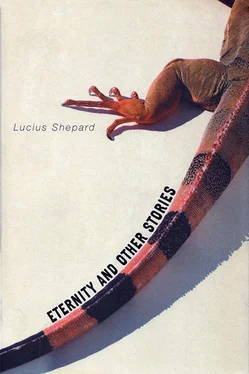Люциус Шепард - Eternity and Other Stories
Здесь есть возможность читать онлайн «Люциус Шепард - Eternity and Other Stories» весь текст электронной книги совершенно бесплатно (целиком полную версию без сокращений). В некоторых случаях можно слушать аудио, скачать через торрент в формате fb2 и присутствует краткое содержание. Город: New York, Год выпуска: 2005, ISBN: 2005, Издательство: Thunder's Mouth Press, Жанр: Фантастика и фэнтези, prose_magic, на английском языке. Описание произведения, (предисловие) а так же отзывы посетителей доступны на портале библиотеки ЛибКат.
- Название:Eternity and Other Stories
- Автор:
- Издательство:Thunder's Mouth Press
- Жанр:
- Год:2005
- Город:New York
- ISBN:978-1-560-25662-5
- Рейтинг книги:5 / 5. Голосов: 1
-
Избранное:Добавить в избранное
- Отзывы:
-
Ваша оценка:
- 100
- 1
- 2
- 3
- 4
- 5
Eternity and Other Stories: краткое содержание, описание и аннотация
Предлагаем к чтению аннотацию, описание, краткое содержание или предисловие (зависит от того, что написал сам автор книги «Eternity and Other Stories»). Если вы не нашли необходимую информацию о книге — напишите в комментариях, мы постараемся отыскать её.
“Lucius Shepard’s stories a jungles — densely alive, sometimes mysterious, often gorgeous, and always dangerous.” — Katerine Dunn, author of Geek Love
Eternity and Other Stories — читать онлайн бесплатно полную книгу (весь текст) целиком
Ниже представлен текст книги, разбитый по страницам. Система сохранения места последней прочитанной страницы, позволяет с удобством читать онлайн бесплатно книгу «Eternity and Other Stories», без необходимости каждый раз заново искать на чём Вы остановились. Поставьте закладку, и сможете в любой момент перейти на страницу, на которой закончили чтение.
Интервал:
Закладка:
The first thing he noticed about the party was that the instant he stepped through the door the stench of the hallway vanished, as if he had penetrated an invisible barrier impermeable to odors. The smells were now those you might expect of any Moscow gathering: perfume, marijuana and cigarette smoke, bad breath, the heat of people pressed together under the sickly lighting, crowded into an unguessable number of rooms. People of every description. Students in sweaters and jeans; old ragged folks with careworn faces, the sort you’d expect to find in the krushovas; beautiful women in couturier gowns; street prostitutes—some equally beautiful—in vinyl micro-minis and fake furs; men dressed like Chemayev himself, members of a mafiya or businessmen with more-or-less reputable interests; musicians with guitars and violins and horns; homosexuals in drag; uniformed soldiers; jugglers. In one corner several fit-looking men wearing jerseys tossed a soccer ball back and forth; in another two actors played a scene to an audience consisting of a blond middle-aged woman in a lab coat and thick spectacles, a thickset man in a wrinkled suit, the very image of a Party hack, and a pretty adolescent girl wearing leg warmers over her tights, holding a pair of ballet slippers. On occasion, as Chemayev and Nataliya forged a path, being pinched and fondled and grabbed in the process, incredible sights materialized, as fleeting as flashes of lightning. A geisha’s painted face appeared between shoulders; she flicked out a slender forked tongue at Chemayev, then was gone. Soon thereafter he caught sight of a small boy whirling as rapidly as a figure skater, transforming himself into a column of dervish blue light. And not long after that they squeezed past a group of men and women attending a giant with a prognathous jaw and a bulging forehead who, kneeling, was as tall as those gathered around him; he reached out his enormous hands and flickering auras manifested about the heads of those he touched. To someone unfamiliar with Eternity these sights might have seemed miraculous; but to Chemayev, who had witnessed similar curiosities on the stage of the theater, they were evidence of Yuri’s talent for illusion. He accepted them in stride and kept pushing ahead. Once he saw a brunette who might have been Larissa laughing flirtatiously on the arm of a slender blond man; he called to her, knocked people aside in his determination to reach her, but she disappeared into the crowd.
There were so many people milling about it was impossible to keep track of any single person, and they were of such great variety it seemed a contemporary Noah had scavenged the streets of the endangered city for two of every kind and brought them to this place of relative security, a cross between the Ark and the Tower of Babel. The hubbub, comprised of talking, singing, laughing—indeed, of every sort of human emission—was deafening, and the only impression Chemayev had of the general aspect of the place was derived from the objects that lined the walls. Overflowing bookcases; side-by-side refrigerators; an ornate China closet containing framed photographs; a massive secretary of golden oak; cupboards, reliquaries, travel posters, portraits, a calendar showing the wrong month and a picture of Siberian wheat fields. Items typical of a middle-class apartment. Smoke dimmed the lighting further, creating an amber haze, twisting with slow torsion into a menagerie of shapes that often appeared identifiable—ephemeral omega signs and kabalistic symbols and mutant Cyrillic characters—beneath which the closely packed heads of the party-goers bobbed and jerked. In various quarters couples were dancing, and due to the heat, many—both men and women—had removed their shirts; but because of the overall exuberance and the general lack of attention paid to the topless women, the effect was not truly prurient and had the casual eroticism of a tribal celebration.
Eventually Nataliya and Chemayev forced their way into a large, relatively under-populated room. No more than fifteen or sixteen people standing in clusters, some occupying the grouping of couches and easy chairs that dominated the far end. Nataliya drew Chemayev aside. “This is ridiculous,” she said. “For all I know we’re following Yuri about. Sit down and I’ll try to find him.”
Oppressed, mentally fatigued, Chemayev was in no mood to argue. Once she had left, he collapsed into an easy chair, let his head fall back, and closed his eyes. The workings of his mind were clouded, murky. It was as if the contents of his skull were the interior of a fishbowl that hadn’t been cleaned for weeks, the water thickened to a brown emulsion in which a golden glint of movement was visible now and again. Though not altogether pleasant, it was an oddly restful state, and he became irritated when a man’s voice intruded, telling a story about two young friends who’d come to Moscow from the north. He tried unsuccessfully to ignore the voice and finally opened his eyes to discover that the room had filled with decrepit, ill-clad men and women, typical denizens of the krushovas. The storyteller was hidden among them and his voice—a slurred yet authoritative baritone—was the only one audible.
“There was a special bond between them,” the man was saying. “They were both misfits in the life they had chosen—or, rather, that had chosen them. They were romantics and their circumstance was the very antithesis of the romantic, suppressing the natural expressions of their hearts and souls. Nicolai—the livelier of the pair—he was more grievously affected. He fancied himself a poet. He aspired to be a new Mayakovsky, to give tongue to the millennial monsters taking shape from the funeral smoke of Communism. A talented, personable fellow. Blond, handsome. For all his bloody deeds, he had something inside him that remained untouched. A core of… not innocence exactly, but a kind of youthful arrogance that counterfeited innocence. That made innocence unnecessary. Who knows what he might have achieved in a more forgiving age?”
This reference to someone named Nicolai and the accompanying description charged Chemayev with new anxiety and caused him to shake off his malaise. He sat up and peered about, trying to locate the speaker. An old woman fixed him with a baleful stare, then turned away. Her faded print dress was hiked up in back, revealing a raddled, purple-veined thigh; one of her grimy stockings had sagged about her calf in folds, like a seven league boot.
“The morning in question,” the man went on, “they got up well before dawn and drove to an open market north of the city. You know the sort of place. A muddy field where vendors set up stalls. Farmers selling vegetables and such. An old bus was parked at the edge of the field. It served as an office for Aleksander Fetisov, the small-time criminal they’d been sent to kill. Fetisov had grown dissatisfied with picking up the crumbs that fell from the table of the big shots. He had grand ambitions. But neither his strength nor his ingenuity had proved equal to those ambitions. When he stepped out of the bus with his bodyguards our heroes opened fire from behind the bushes where they had hidden themselves. The farmers ran away.
“Nicolai knelt beside Fetisov’s body. He needed proof that they’d done the job. A watch, a ring. Some identifiable token. As his friend searched the dead man’s clothing Viktor moved up behind him and aimed a pistol at his head. It would have been merciful if he had pulled the trigger right at that second, but he wasn’t committed to the act. He was still trying to think of a way out… even though he knew there was none. He couldn’t understand why Polutin had ordered him to kill Nicolai. But for Viktor, lack of understanding was not sufficient cause to break ranks. In this he differed from Nicolai. And of course, though he couldn’t see it at the time, this was the reason Polutin had ordered Nicolai’s death—he had too much imagination to be a good soldier.”
Читать дальшеИнтервал:
Закладка:
Похожие книги на «Eternity and Other Stories»
Представляем Вашему вниманию похожие книги на «Eternity and Other Stories» списком для выбора. Мы отобрали схожую по названию и смыслу литературу в надежде предоставить читателям больше вариантов отыскать новые, интересные, ещё непрочитанные произведения.
Обсуждение, отзывы о книге «Eternity and Other Stories» и просто собственные мнения читателей. Оставьте ваши комментарии, напишите, что Вы думаете о произведении, его смысле или главных героях. Укажите что конкретно понравилось, а что нет, и почему Вы так считаете.












